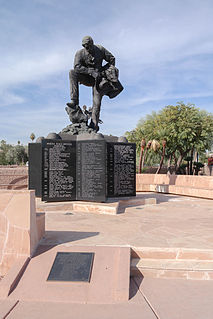Related Research Articles
The State of the Union Address is an annual message delivered by the president of the United States to a joint session of the United States Congress near the beginning of each calendar year on the current condition of the nation. The State of the Union Address generally includes reports on the nation's budget, economy, news, agenda, achievements and the president's priorities and legislative proposals.

The United States Department of Education is a Cabinet-level department of the United States government. It began operating on May 4, 1980, having been created after the Department of Health, Education, and Welfare was split into the Department of Education and the Department of Health and Human Services by the Department of Education Organization Act, which President Jimmy Carter signed into law on October 17, 1979.
The Boland Amendment is a term describing three U.S. legislative amendments between 1982 and 1984, all aimed at limiting U.S. government assistance to the Contras in Nicaragua. The first Boland Amendment was part of the House Appropriations Bill of 1982, which was attached as a rider to the Defense Appropriations Act of 1983, named for the Massachusetts Democrat, Representative Edward Boland, who authored it. The House of Representatives passed the Defense Appropriations Act 411–0 on December 8, 1982, and it was signed by President Ronald Reagan on December 21, 1982. The amendment outlawed U.S. assistance to the Contras for the purpose of overthrowing the Nicaraguan government, while allowing assistance for other purposes.

The Authorization for Use of Military Force Against Iraq Resolution of 2002, informally known as the Iraq Resolution, is a joint resolution passed by the United States Congress in October 2002 as Public Law No. 107-243, authorizing the use of the United States Armed Forces against Saddam Hussein's Iraq government in what would be known as Operation Iraqi Freedom.
The United States budget process is the framework used by Congress and the President of the United States to formulate and create the United States federal budget. The process was established by the Budget and Accounting Act of 1921, the Congressional Budget and Impoundment Control Act of 1974, and additional budget legislation.
The Joint Committee on the Library is a Joint Committee of the United States Congress devoted to the affairs and administration of the Library of Congress, which is the library of the federal legislature. There are five members of each house on the committee. It has no subcommittees.

National Catfish Day is a national observance of the United States celebrating "the value of farm-raised catfish." The day was designated as June 25, 1987, by President Ronald Reagan, who issued the Presidential Proclamation after the U.S. Congress called for the day to be established in House Joint Resolution 178.
German-American Day is a holiday in the United States, observed annually on October 6 under Pub.L. 100–104, 101 Stat. 721. It celebrates German-American heritage and commemorates the founding of Germantown, Pennsylvania in 1683.
In the United States Congress, a joint resolution is a legislative measure that requires passage by the Senate and the House of Representatives and is presented to the President for his approval or disapproval. Generally, there is no legal difference between a joint resolution and a bill. Both must be passed, in exactly the same form, by both chambers of Congress, and signed by the President to become a law. Only joint resolutions may be used to propose amendments to the United States Constitution and these do not require the approval of the President. Laws enacted by joint resolutions are not distinguished from laws enacted by bills, except that they are designated as resolutions as opposed to Acts of Congress.
The National Day of Prayer is an annual day of observance held on the first Thursday of May, designated by the United States Congress, when people are asked "to turn to God in prayer and meditation". The president is required by law to sign a proclamation each year, encouraging all Americans to pray on this day.

William Lester Armstrong Jr. was an American businessman, administrator, and politician. He was a member of the Republican Party and served as a United States representative and Senator from Colorado.
White Cane Safety Day is a national observance in the United States, celebrated on October 15 of each year since 1964. The date is set aside to celebrate the achievements of people who are blind or visually impaired and the important symbol of blindness and tool of independence, the white cane.
Women's History Month is an annual declared month that highlights the contributions of women to events in history and contemporary society. It is celebrated during March in the United States, the United Kingdom, and Australia, corresponding with International Women's Day on March 8, and during October in Canada, corresponding with the celebration of Persons Day on October 18.
Asian American and Pacific Islander Heritage Month is observed in the United States during the month of May, and recognizes the contributions and influence of Asian Americans and Pacific Islander Americans to the history, culture, and achievements of the United States.

Peace Officers Memorial Day and Police Week is an observance in the United States that pays tribute to the local, state, and federal peace officers who have died, or who have been disabled, in the line of duty. It is celebrated May 15th of each year. The event is sponsored by the National Fraternal Order of Police (FOP) and is implemented by the FOP Memorial Committee.
In the United States, National Ice Cream Month is celebrated each year in July, and National Ice Cream Day is celebrated on the third Sunday in July.
Grandparents' Day or National Grandparents' Day is a secular holiday celebrated in various countries; it is celebrated to show the bond between grandparents and grandchildren. It occurs on various days of the year, either as one holiday or sometimes as a separate Grandmothers' Day and Grandfather's Day.

Women's Equality Day is celebrated in the United States on August 26 to commemorate the 1920 adoption of the Nineteenth Amendment to the United States Constitution, which prohibits the states and the federal government from denying the right to vote to citizens of the United States on the basis of sex. It was first celebrated in 1971, designated by Congress in 1973, and is proclaimed each year by the United States President.
The presidency of Ronald Reagan began on January 20, 1981, when Ronald Reagan was inaugurated as the 40th president of the United States, and ended on January 20, 1989.
References
- ↑ Moorhead, Carlos J. (1982-05-13). "H.J.Res.487 - 97th Congress (1981-1982): A joint resolution authorizing and requesting the President to proclaim 1983 as the "Year of the Bible"". www.congress.gov. Retrieved 2020-04-02.
- ↑ Armstrong, William L. (1982-10-04). "S.J.Res.165 - 97th Congress (1981-1982): A joint resolution authorizing and requesting the President to proclaim 1983 as the "Year of the Bible"". www.congress.gov. Retrieved 2020-04-02.
- ↑ "PUBLIC LAW 97-280—OCT. 4, 1982, "Year of the Bible"" (PDF). Govinfo.gov. October 4, 1982.
- ↑ 111th Congress (2009) (May 7, 2009). "H.Con.Res. 121 (111th)". Legislation. GovTrack.us. Retrieved October 7, 2012.
Encouraging the President to designate 2010 as "The National Year of the Bible".
- ↑ Victoria McGrane (May 22, 2009). "Lawmaker wants to make 2010 'Year of the Bible'". Politico. Retrieved October 7, 2012.
- ↑ "Lawmakers designate 'Year of the Bible' in Pa. — NewsWorks". Archived from the original on 2014-05-02. Retrieved 2012-02-05.
- ↑ "All Pennsylvania Atheists to Celebrate 2012 As the Year of the Bible « No God Blog". atheists.org. Archived from the original on 2012-02-01.
- ↑ Perce, Ernest V (March 1, 2012). "American Atheists, Inc. "Slaves Obey Your Masters" Billboard to Challenge the "Year of the Bible" in Harrisburg, PA" (Press release). American Atheists . Retrieved April 30, 2014.
- ↑ Watins, Morgan (December 22, 2016). "Bevin: 2017 is Also the 'Year of the Bible'". courier-journal.com. Retrieved January 9, 2017.
- ↑ Brammer, Jack (December 21, 2016). "Bevin Declares 2017 the 'Year of the Bible' in Kentucky". Lexington Herald-Leader . Retrieved January 9, 2016.